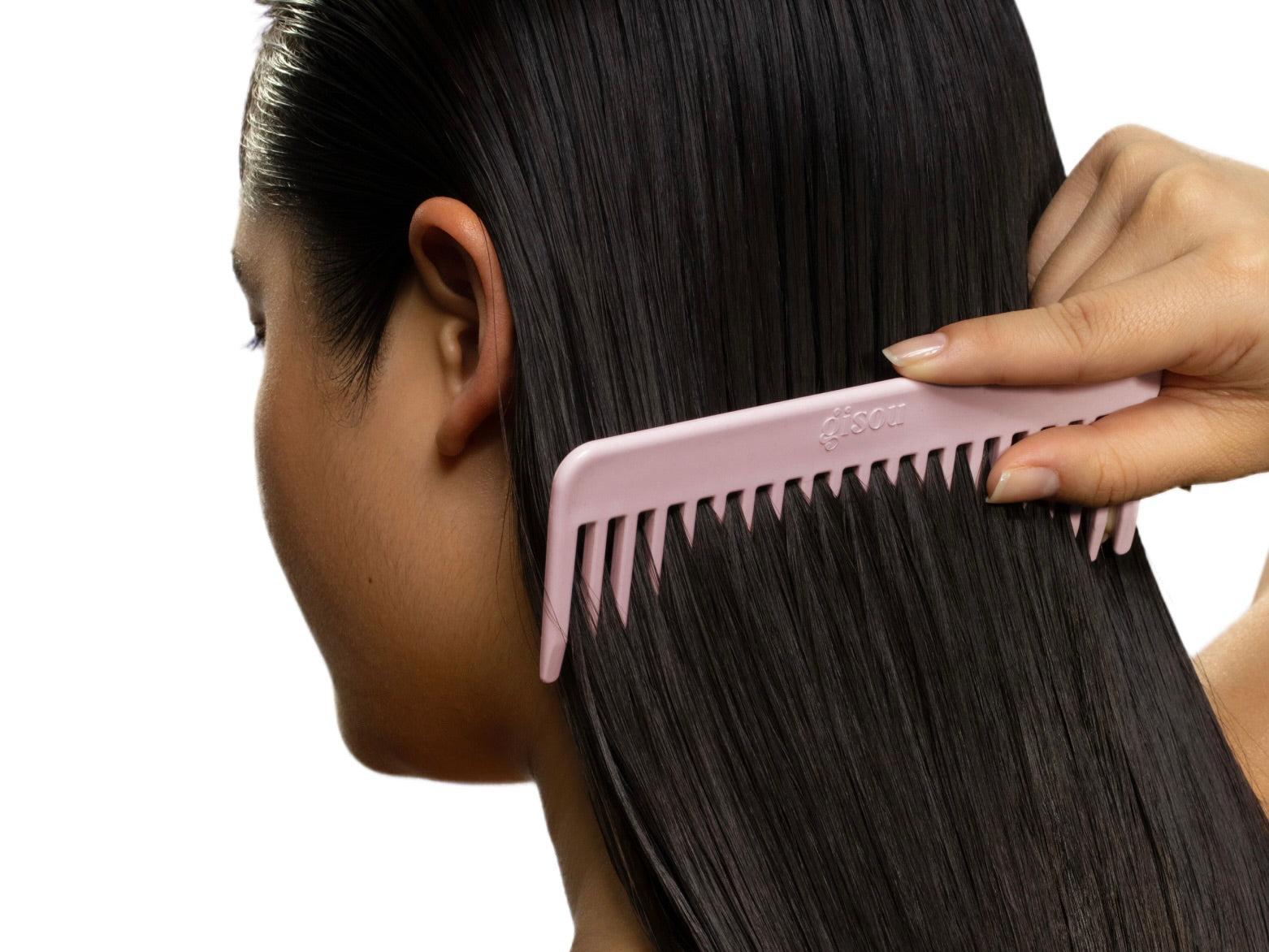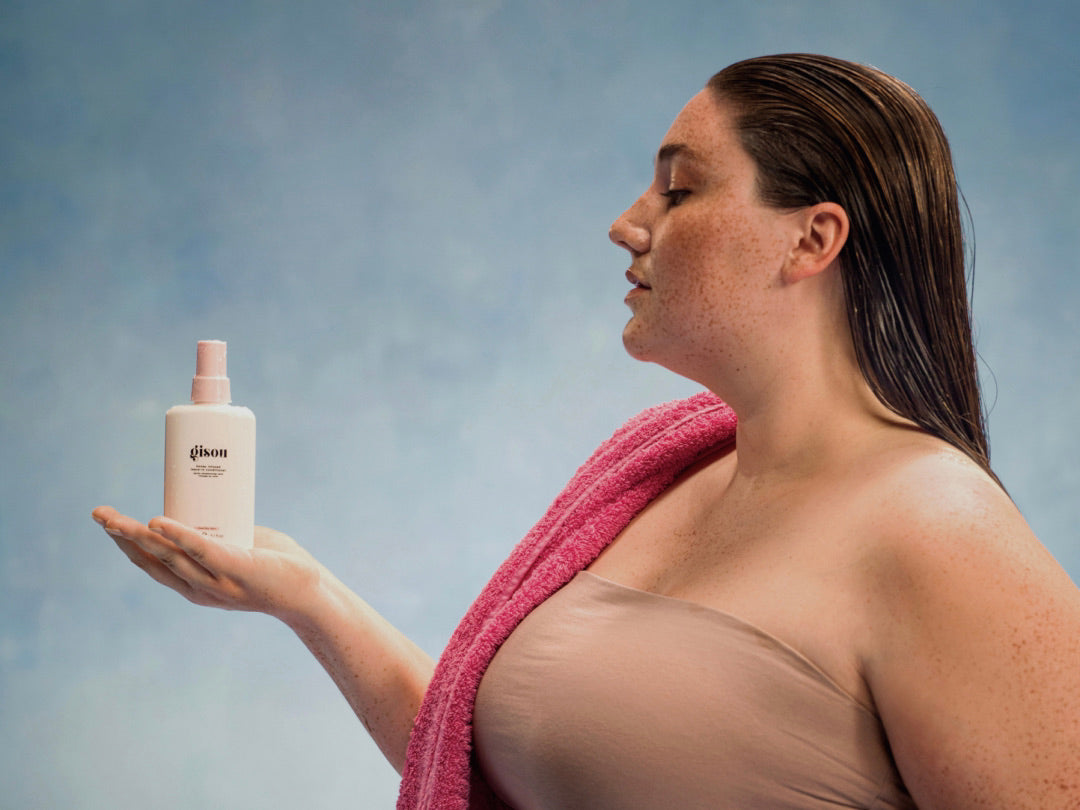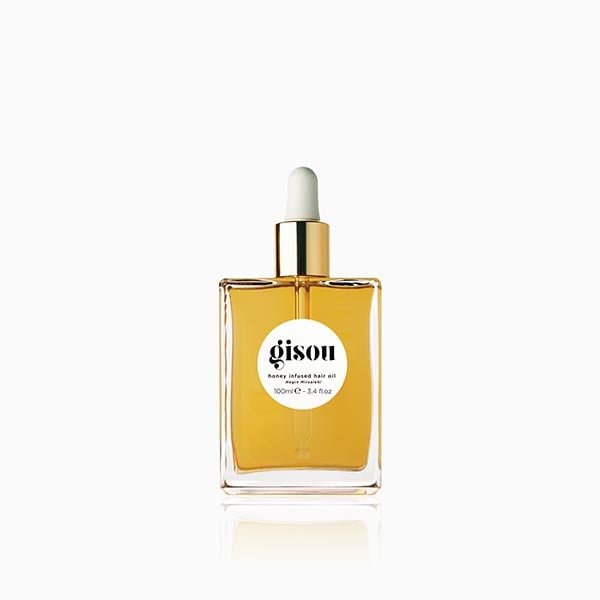How to Keep Hair From Tangling & Why It Happens
Whether you have long, lustrous locks or a shorter, edgy style, hair tangling is a common issue that can be a real nuisance. Why does hair tangle so easily? Is it purely a matter of hair type, or are there other factors at play?
In this article, we’ll uncover the most common causes of tangled hair and offer some proactive solutions to keep your hair tangle-free and looking fabulous! Ready to bid farewell to those daily battles with your hairbrush and embrace a smoother, more manageable mane? Here’s what you need to know!

Why Does Hair Tangle So Easily?
Why does your hair tangle so easily? The frustration is real, but understanding why it happens is the first step to learning how to keep hair from tangling in the first place. Hair type, lack of moisture, friction, and damage are the four main factors that come into play.
Hair Type
You guessed it! Hair type plays a major role in how prone your strands are to tangling. Due to its smooth, uniform structure, straight hair may tangle less frequently. However, if your hair is long and fine, it is likely more prone to tangling, whether it’s curly or straight.
The twists and turns of curly hair make it much more susceptible to tangling. Wavy hair falls somewhere in between straight and curly, and its susceptibility to tangling depends on the tightness of your wave pattern. As you can imagine, the complex pattern of coily or kinky hair allows it to interweave and tangle very easily.
Lack of Moisture
Dry hair is more prone to friction and static, which causes the strands to tangle and interweave. Environmental factors like wind and low humidity can sap the moisture out of your hair, leaving it dehydrated and more prone to tangles.
Excessive shampooing or using the wrong shampoo can strip your hair of its natural oils, leaving it dry and vulnerable to tangles. Frequent heat styling can also damage the hair cuticle, and reduce its ability to retain moisture.
Damaged Ends and Cuticles
When the protective outer layer of your hair, the cuticle, is damaged, it can expose the inner layers to friction and cause tangling. Split ends are also a common issue that can lead to tangling and should be trimmed regularly.
Chemical treatments, excessive heat styling, environmental stressors, and using the wrong hair products are the most common causes of damaged ends and cuticles.
Friction
Friction is perhaps the most straightforward yet significant factor that causes tangles. When the strands of your hair rub together, they often become entangled. Friction becomes an issue when the hair rubs repeatedly against clothing, pillowcases, and certain hair accessories.
Vigorous towel drying can also lead to friction-induced tangling. And, of course, environmental factors like wind are also a leading cause of tangling and friction.

How to Prevent Tangled Hair
So, what can you do to address these common causes of tangled hair? Fortunately, there are many proactive steps you can take to improve the overall condition of your hair and keep it tangle-free. Here’s how to prevent hair from tangling and maintain a head-turning mane!
Condition Every Time You Shampoo
Conditioning is an essential step in your hair care routine that should never be skipped. Using conditioner after every shampoo helps to replenish moisture and smooth the hair cuticle, reducing the likelihood of tangles.
Focus on applying our Honey-Infused Conditioner from the mid-lengths to the ends. This weightless, nourishing conditioner is formulated to gently detangle, leaving the hair manageable and strong.
Use your fingers or a wide-tooth comb to gently remove any tangles and distribute the conditioner evenly throughout your hair. Allow the conditioner to sit on your hair for 1-2 minutes before rinsing it with cool water to give it a chance to work its magic.
Hydrate Daily with Leave-In Conditioner
We suggest incorporating a leave-in conditioner into your routine any time your hair needs some extra moisture. It can be applied to damp hair before combing for easier detangling and less damage or applied to dry hair before styling in between wash days.
Our Honey-Infused Leave-In Conditioner is a lightweight, multi-tasking spray that hydrates, smooths, and detangles the hair. It also adds a layer of protection against pollution, heat damage, and breakage, which is key for preventing tangles. To apply, simply spray evenly from mid-lengths to ends and comb through to distribute.

Deep Condition Regularly
In addition to your regular conditioner, consider incorporating a deep-conditioning hair mask into your routine at least once a week. These intensive treatments can help repair damage and keep your hair soft and tangle-free.
Our Honey-Infused Hair Mask is ideal for improving the condition of your hair and keeping tangles at bay. It provides intense nourishment to improve the elasticity of your hair and add shine. Use it on dry, damp, or wet hair in the shower or overnight.
Seal Your Ends
Applying our Honey-Infused Hair Repair Serum to the ends of your hair can help seal split ends, reducing the chances of the split ends traveling up the hair shaft and leaving it more prone to tangling. It also intensively hydrates the hair, smooths frizz, and repairs damage to prevent breakage that can contribute to tangling.
Apply the hair serum to damp hair after showering, before you begin your styling process. Simply dispense a dropper full of serum into the palm of your hand, rub your palms together, and work the serum through the lengths of your hair, focusing on the ends. Adjust the amount of serum used based on the length and thickness of your hair.
Use Hot Tools Less Often
Frequent use of heat styling tools can lead to damage and dryness, making your hair more prone to tangling. Consider embracing your natural texture more often and limit heat styling to special occasions. When you do use hot tools, always apply a heat-protecting spray first.
Our Propolis Infused Heat Protecting Spray is designed to protect the hair against heat damage caused by blow drying, styling tools, and the sun. Mist it evenly throughout your hair before applying heat tools or spending time in the sun to create a protective barrier against damage and moisture loss.
Protect Your Hair While You Sleep
Your nighttime routine can make a big difference when it comes to preventing tangles. Consider making the switch to a silk pillowcase. Good quality silk creates less friction with the hair than cotton.
Gently tying your hair into a loose braid or bun is also a great way to prevent friction and tangles while you sleep. You can also wrap your hair in a silk or satin head wrap or scarf to protect it from friction, prevent tangles, and maintain your style.
Go Easy with the Towel
Rubbing your hair vigorously with a towel can create friction and cause tangles. Instead, gently pat your hair dry with a microfiber towel designed to soak up moisture. If you have textured hair, consider trying the plop method using a t-shirt to improve curl definition, reduce friction, and minimize tangles
Get Regular Trims
Regular trims are essential for maintaining healthy hair and preventing split ends that can lead to tangling. Aim for a trim at least every 6-8 weeks to keep your ends in good shape.
Oil Your Hair Regularly
Using hair oil regularly provides your hair with much-needed moisture and protection against tangles. Hair oil not only prevents hair breakage but also reduces frizz and smoothes the hair cuticle to help keep tangles at bay.
Our Honey Infused Hair Oil can be used as a pre-styling and finishing product, a pre-shampoo treatment, applied as an intensive conditioning treatment overnight, or added to your weekly hair mask to amp up the benefits.
Avoid Sulfates and Other Harsh Ingredients
When choosing your hair care products, avoid harsh detergents like sulfates, which can strip the hair of its natural oils and make it more prone to tangling. Opt for natural, sulfate-free formulas like our Honey-Infused Hair Wash, which is free of ingredients that strip the hair.

Utilize Protective Hairstyles
For times when your hair will be exposed to wind and other harsh weather conditions, consider securing it into a protective hairstyle, like braids, twists, or a bun. These styles not only look great but also reduce friction and tangling.
Helpful Detangling Tips
Taming tangled hair can be a pain, but with the right tools and techniques, you make the process much easier. Here are a few helpful detangling tips to help you navigate those pesky knots with ease.
- Start with Leave-In Conditioner: Before you even pick up the comb, mist your hair with a leave-in conditioning spray. It will add an extra layer of moisture and slip to the hair, making it easier to detangle.
- Use a wide-tooth comb or a detangling brush: When it comes to detangling, the right tool makes all the difference. Reach for a wide-tooth comb or a detangling brush. They’re gentler on the hair and less likely to cause breakage.
- Divide and conquer: Don’t try to tackle it all at once! Divide your hair into smaller sections and work on each section one by one.
- Work from the ends Up: Always start detangling at the ends of your hair and gradually work your way up toward the roots. This method minimizes stress on your hair and reduces the risk of breakage.
Embrace Tangle-Free Hair
From incorporating the right products and tools to adopting healthy hair care habits and gentle detangling techniques, you’re now armed with the knowledge to face tangles head-on. Our line of Honey-Infused hair care products can help you rebuild and repair your hair, resulting in stronger, shinier, and softer locks that are less prone to tangles!















